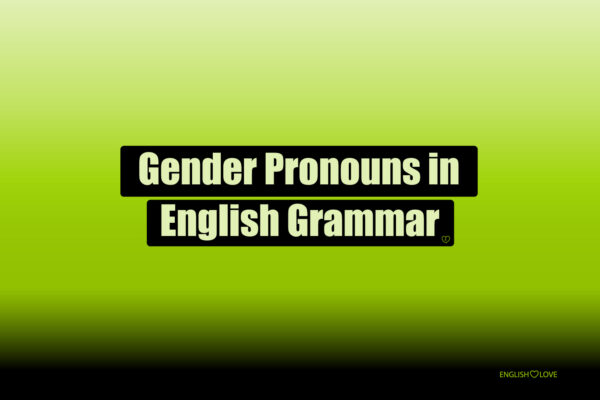In the realm of English grammar, pronouns play a pivotal role. They are versatile words that replace nouns, preventing redundancy and making sentences smoother. This guide delves deep into the various types of pronouns in English, offering definitions, examples, and a comprehensive list for quick reference.
Types of Pronouns: An Overview
Personal Pronouns:
-
- Definition: These pronouns replace specific names or nouns in sentences, streamlining communication by distinguishing between the speaker, the listener, and others.
- Usage: They prevent repetition in conversations. For instance, instead of saying “John said John would come,” we use the pronoun “he” to say “John said he would come.”
Possessive Pronouns:
-
- Definition: Indicators of ownership or association, these pronouns clarify to whom or to what something belongs.
- Usage: They establish clear relationships and boundaries in sentences. For instance, “That book is mine” uses “mine” to indicate ownership.
Demonstrative Pronouns:
-
- Definition: These pronouns point out and emphasize specific items or entities.
- Usage: Useful in distinguishing items based on proximity or clarity. For example, “This is my pen” versus “That is your pen.”
Interrogative Pronouns:
-
- Definition: As the name suggests, these pronouns are used to ask questions.
- Usage: They help in seeking information or clarifying doubts. Examples include questions like “Who is that?” or “Which one do you prefer?”
Relative Pronouns:
-
- Definition: These pronouns introduce dependent clauses, linking related ideas or clauses in complex sentences.
- Usage: They provide additional information about a noun or pronoun in the main clause. For example, “The man who called yesterday is my uncle.”
Indefinite Pronouns:
-
- Definition: These pronouns refer to non-specific people or things, adding a layer of generality to statements.
- Usage: Useful when the exact noun is unknown or irrelevant. For instance, “Someone left their umbrella” or “Everyone is welcome.”
Reciprocal Pronouns:
-
- Definition: These pronouns indicate mutual actions or feelings between two or more entities.
- Usage: They highlight shared experiences or actions. For example, “The two teams played against each other.”
Intensive Pronouns:
-
- Definition: Used for emphasis, these pronouns reiterate the importance of a particular noun or another pronoun in a sentence.
- Usage: They add emphasis to the subject or object. For instance, “I myself saw the incident.”
Reflexive Pronouns:
-
- Definition: These pronouns redirect an action or sentiment back onto the subject of the sentence.
- Usage: They indicate when an action or feeling is directed towards oneself. For example, “She hurt herself.”
Personal Pronouns List
Personal pronouns are foundational in English. They act as substitutes for specific names or nouns, allowing for fluidity in conversation. Without them, we’d be constantly repeating names, making dialogue cumbersome. They help in distinguishing between the speaker, the listener, and others being discussed, making communication clear and concise.
Examples:
-
- I
- you
- he
- she
- it
- we
- they
- us
- him
- her
Usage Situation: When referring to the speaker, the listener, or someone/something being talked about.
Possessive Pronouns: Claiming Ownership
Possessive pronouns are all about denoting ownership or association. They help clarify who or what something belongs to, eliminating ambiguity. In a world where possessions and associations matter, these pronouns play a crucial role in establishing clear relationships and boundaries.
- Examples:
- my
- your
- his
- her
- its
- our
- their
- mine
- yours
- hers
- theirs
Usage Situation: When indicating that something belongs to someone.
Demonstrative Pronouns List
Demonstrative pronouns are essential for pointing out and emphasizing specific items or entities. They help in distinguishing between items based on proximity or clarity, making them invaluable in both spoken and written English. Their usage aids in drawing attention to particular subjects of interest.
Examples:
-
- this
- that
- these
- those
Usage Situation: When identifying or emphasizing specific objects or people, either close by or farther away.
Interrogative Pronouns List
Interrogative pronouns are the cornerstones of curiosity. They pave the way for questions, helping us seek information, clarify doubts, and understand the world around us. In every culture and language, the art of questioning is vital, and in English, these pronouns serve that purpose.
Examples:
-
- who
- whom
- which
- what
- whose
- whomever
- whichever
Usage Situation: When forming questions about identity, choice, or ownership.
Relative Pronouns: Connecting Ideas
Relative pronouns act as connectors in sentences. They introduce additional information, often linking two related ideas or clauses. By using them, we can create complex sentences that provide richer context and meaning, enhancing the depth and flow of communication.
Examples:
-
- who
- whom
- which
- that
- whose
- whoever
- whichever
Usage Situation: When providing additional information about a noun or pronoun in the main clause.
Indefinite Pronouns List
Indefinite pronouns are about embracing the unknown or unspecified. In situations where we don’t need or want to specify a particular noun, these pronouns come to our aid. They add a layer of generality, allowing for broader interpretations and discussions.
Examples:
-
- all
- any
- each
- every
- no one
- none
- some
- anybody
- anyone
- anything
- several
- few
- many
- both
- neither
- either
Usage Situation: When referring to unspecified or unknown entities.
Reciprocal Pronouns List
Reciprocal pronouns capture the essence of mutual actions or feelings. They depict shared experiences, emphasizing the collective nature of an action. In relationships and group dynamics, these pronouns highlight the shared bond and mutual understanding among individuals.
Examples:
-
- each other
- one another
Usage Situation: When describing actions or feelings that are reciprocated among a group.
Intensive Pronouns List
Intensive pronouns are all about adding a punch of emphasis. They reiterate the importance or focus on a particular noun or pronoun, making sure the listener or reader grasps the significance of what’s being discussed. They’re like the exclamation points of the pronoun world.
Examples:
-
- myself
- yourself
- himself
- herself
- itself
- ourselves
- themselves
- yourself
Usage Situation: When wanting to add emphasis to the subject or object in a sentence.
Reflexive Pronouns List
Reflexive pronouns are introspective. They turn the action or sentiment back onto the subject, creating a reflective effect. They’re essential for indicating when an action or feeling is directed towards oneself, adding depth and clarity to sentences.
Examples:
-
- myself
- yourself
- himself
- herself
- itself
- ourselves
- themselves
Usage Situation: When the subject and the object of the verb are the same, indicating the action is done to oneself.
List of all pronouns in English
Pronouns in English serve as indispensable tools, ensuring our language remains fluid and efficient. They act as placeholders, stepping in for nouns to prevent redundancy and maintain clarity. The table above categorizes these pronouns based on their functions. Personal pronouns, for instance, represent specific individuals or things. Possessive pronouns indicate ownership, while demonstrative pronouns point to specific items. Interrogative pronouns are the foundation of questions, and relative pronouns connect clauses. Lastly, indefinite pronouns refer to non-specific entities. Understanding and mastering these pronouns is crucial for effective communication in English, as they are foundational to constructing meaningful sentences.
| Type of Pronoun | Pronouns |
|---|---|
| Personal Pronouns | |
| – Subjective | I, you, he, she, it, we, they |
| – Objective | me, you, him, her, it, us, them |
| Possessive Pronouns | |
| – Adjective form | my, your, his, her, its, our, their |
| – Standalone | mine, yours, his, hers, ours, theirs |
| Demonstrative Pronouns | this, that, these, those |
| Interrogative Pronouns | who, whom, which, what, whose |
| Relative Pronouns | who, whom, whose, which, that |
| Indefinite Pronouns | all, another, any, anybody, anyone, anything, both, each, few, |
| many, neither, nobody, none, one, other, several, some, somebody |
Examples of Pronouns in Sentences
She loves to read books. (Personal Pronoun – Subjective)
I gave the book to him. (Personal Pronoun – Objective)
That is her car parked outside. (Possessive Pronoun – Adjective form)
The choice is yours. (Possessive Pronoun – Standalone)
This is my favorite song. (Demonstrative Pronoun)
Those were the days. (Demonstrative Pronoun)
Who is that? (Interrogative Pronoun)
Whose book is this? (Interrogative Pronoun)
The woman who called yesterday is my aunt. (Relative Pronoun)
The book that I bought is interesting. (Relative Pronoun)
Everyone is invited to the party. (Indefinite Pronoun)
Someone left their jacket here. (Indefinite Pronoun)
She did it herself. (Reflexive Pronoun)
I told myself not to worry. (Reflexive Pronoun)
I myself saw the incident. (Intensive Pronoun)
The president himself will attend the meeting. (Intensive Pronoun)
They gave gifts to each other. (Reciprocal Pronoun)
The two teams competed against one another. (Reciprocal Pronoun)
In Conclusion
Pronouns are an integral part of English grammar, aiding in clarity and coherence. This guide serves as a handy reference for learners, ensuring they have a solid grasp of pronoun usage. For further exploration into English grammar topics, consider checking out other resources.
FAQ about List of Pronouns
Why are pronouns important in English?
Pronouns play a pivotal role in English by replacing nouns, preventing repetitive and redundant usage of names or nouns. They help in making sentences concise, clear, and more natural-sounding, facilitating smoother communication.
Can a sentence be constructed without using pronouns?
Yes, its possible to construct sentences without pronouns, especially when providing specific information. However, overusing nouns instead of pronouns can make sentences sound repetitive and less fluent.
Are there pronouns that can be both singular and plural?
Yes, some pronouns can be used in both singular and plural contexts. For instance, you can refer to one person or several people, and any can refer to any one of a group or any part of a quantity.
How do I know which pronoun to use in a sentence?
The choice of pronoun depends on its function in the sentence and the noun its replacing. For example, if youre referring to a specific male person, youd use he. If youre asking about ownership, you might use whose. Context and grammar rules will guide the correct choice of pronoun.



